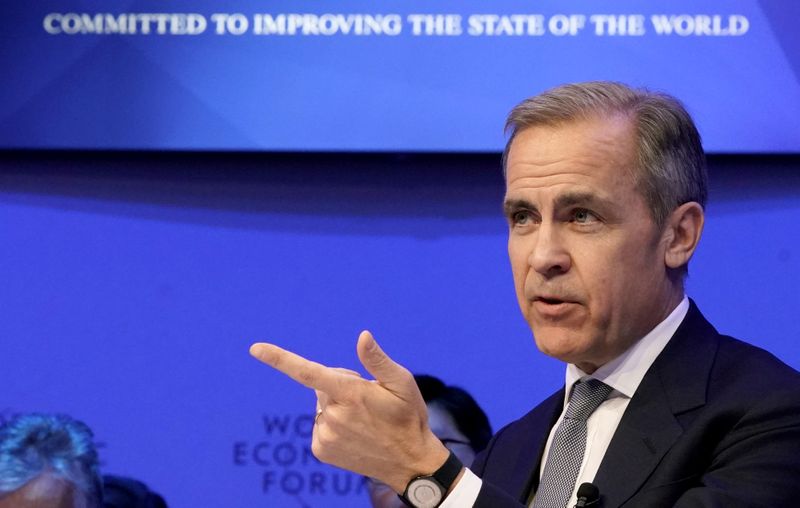
FILE PHOTO: Governor of the Bank of England Mark Carney attends a session at the 50th World Economic Forum (WEF) annual meeting in Davos, Switzerland, January 21, 2020. REUTERS/Denis Balibouse
January 30, 2020
By David Milliken
LONDON (Reuters) – The Bank of England appears close to cutting interest rates for the first time in more than three years in Governor Mark Carney’s final policy vote on Thursday, the day before Britain leaves the European Union.
The British central bank will assess the economy’s near standstill in late 2019, against early signs that Prime Minister Boris Johnson’s emphatic victory in December’s election has boosted confidence, at least for now.
Financial markets priced in a 45% chance on Wednesday that the Monetary Policy Committee would cut Bank Rate to 0.5% from 0.75%. Economists polled by Reuters two weeks ago predicted a 6-3 vote to keep rates on hold.
Two policymakers, Michael Saunders and Jonathan Haskel, have been voting for a rate cut since November. Comments from Carney and two other policymakers since then have raised the chance that a majority of MPC members will now back a cut.
“Whether they cut or not is finely balanced, but recent BoE speeches suggest urgency,” Bank of America economist Robert Wood told clients on Wednesday, predicting a quarter-point rate cut.
With rates near zero, limiting the BoE’s options if there is a severe economic downturn, Carney said this month that there could be a case for a precautionary cut.
Unlike the U.S. Federal Reserve and the European Central Bank, the BoE did not loosen policy in 2019, when Britain’s economic prospects were clouded by Brexit uncertainty.
After Thursday’s announcement, future decisions will be guided by Andrew Bailey, currently chief executive of Britain’s Financial Conduct Authority, who succeeds Carney on March 16.
The latest economic data suggests the BoE could afford to continue a wait-and-see approach.
Although official figures show Britain’s economy grew at the weakest annual pace since 2012 in November, the job market remains strong and business sentiment has rebounded since Johnson’s Dec. 12 election win.
Lloyds Bank said its monthly poll of 1,200 companies showed the strongest business sentiment in more than a year.
The election result has brought short-term certainty in the form of an 11-month transition period that begins when Britain formally leaves the EU at 2300 GMT on Friday.
But many businesses face the risk of major disruption at the end of 2020 if Johnson cannot rapidly agree a deal with the EU.
Another factor that could deter the BoE from cutting rates is Johnson’s promise to increase investment significantly in an annual budget plan in March.
“We suspect a majority on the MPC will want to wait for more hard data, and to see the extent of any fiscal response in the March budget,” BNP Paribas economist Paul Hollingsworth said.
Mirroring the uncertainty in markets, a record proportion of the public said they did not know how the BoE would adjust rates, when asked in a survey by IHS Markit this month.
(Additional reporting by Andy Bruce; Editing by William Schomberg and Hugh Lawson)

